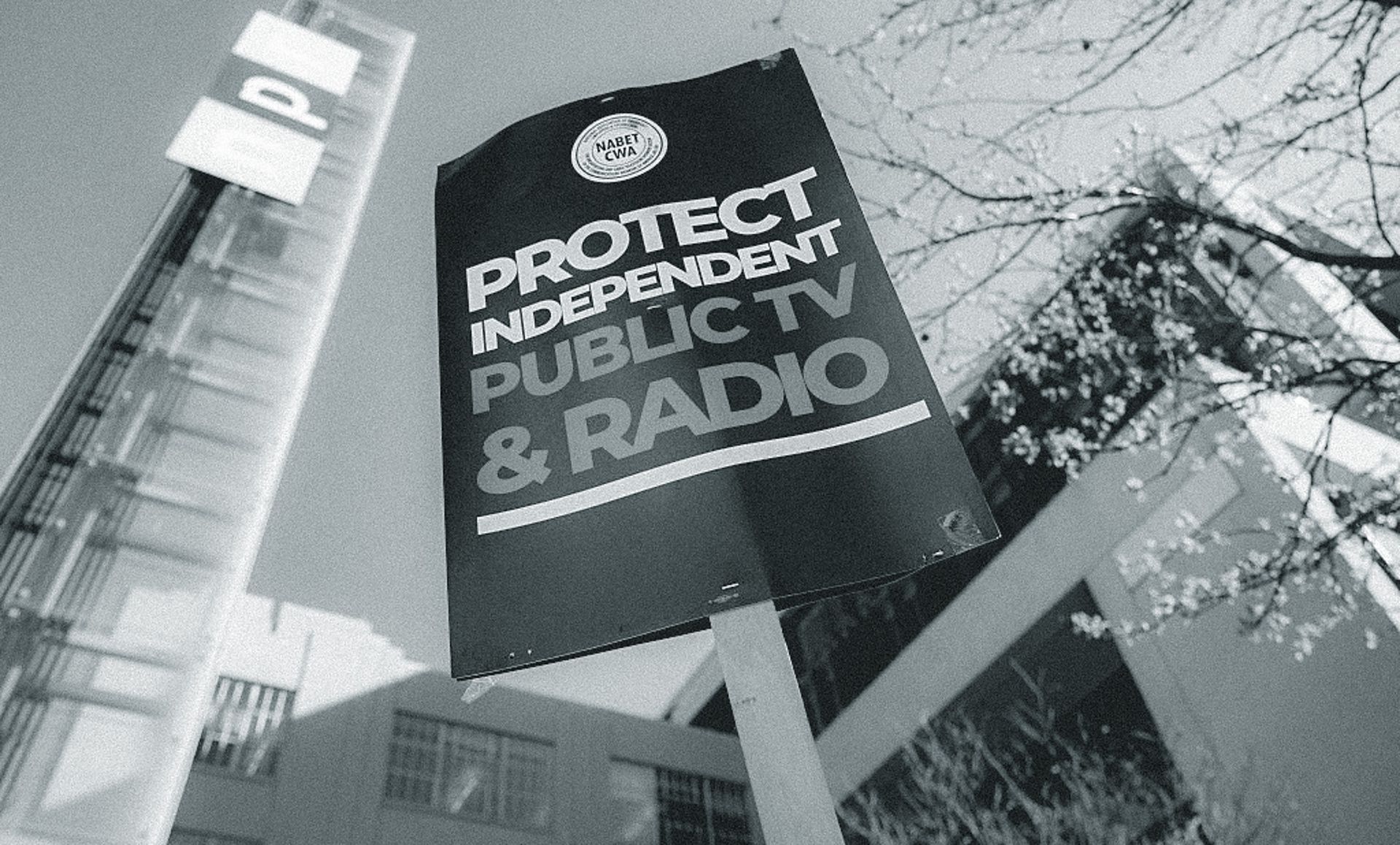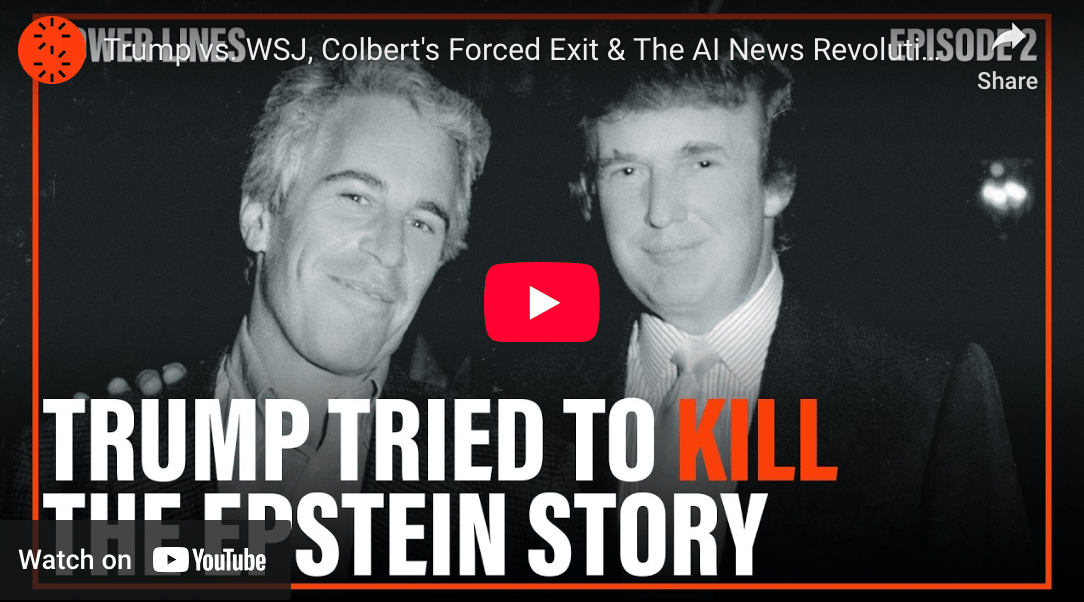
People rally for Congress to protect funding for NPR and PBS. (Photo by Saul Loeb/AFP via Getty Images)
In an unprecedented move, the federal government this week pulled the plug on public media. Congressional Republicans acting on Donald Trump’s orders rescinded more than $1 billion in funding for NPR, PBS, and their hundreds of member stations dotting the country—a radical move that threatens to further wreak havoc on America’s already struggling local news ecosystem.
In an interview with Status, Katherine Maher, the chief executive of NPR, didn't mince words. She described the decision as politically motivated, structurally damaging, and devastating to rural communities where public broadcasting is often the last reliable source of local journalism. The vote, she warned, "may make it impossible" for some local stations to continue operating, adding that some "are already pulling shutdown plans out of their desks."
Below is our Q&A, lightly edited for style.
What was your first reaction when you saw the final vote come through rescinding public media funding?
Deep frustration. Throughout this process, the political rhetoric has been about punishing NPR (and PBS) for editorial and programming decisions. But the reality is that NPR receives less than half of one percent of all federal funds for public broadcasting. More than 70% goes directly to local stations.
Meanwhile, lawmakers from both parties continuously acknowledge—in public and private—how important their local stations are to their constituents. In this sense, it’s a bit like Congress itself: the institution may have low approval ratings, but people generally approve of their local representatives. This eviscerates funding for those independent, community-based stations. And for what purpose? Scoring political points by saying you voted against NPR and PBS.
How big of a financial hit is this for NPR and the public media ecosystem overall? Can you quantify it in practical terms?
It’s a big hit. The hit is much harder for public television, which receives 75% of all public funding. Already they’ve lost $30 million in funding for children’s educational programming which resulted in immediate layoffs and canceled programs. If you love and value public television, you should be very concerned right now.
Radio has always been scrappier and more financially independent but running radio operations in remote, rural, and rugged parts of the country is very expensive. Public radio currently serves 99.7% of Americans—I expect you’ll see nearly immediate loss of universal coverage in hard-to-reach parts of the country, as well as layoffs of journalists covering local and state news.
The loss of funding may make it impossible for local stations in places like rural Alaska and Appalachia to continue to operate—stations that receive as much as 70% of their budget from federal funds. Stations like these are already pulling shutdown plans out of their desks.
At NPR we have already committed to reduce our own operating budget by $8 million, in order to offer rescission-related fee relief to stations as a way of helping them bridge this immediate shortfall. We know that NPR will continue to operate, but the total financial impact will become clearer in the weeks and months ahead.
Do you think this vote was about the budget or about politics?
This vote was about politics and power. The total annual federal budget for public media is $535 million per year, of which $121 million goes to the public radio network—$100 million directly to stations. Already we’ve seen lawmakers make statements they’ll try and find some of that key infrastructure, local, emergency, and tribal funding elsewhere.
This entirely disregards that public media works as an integrated system of shared infrastructure, services, information, and programming. In any case, I’m skeptical that those promises have any real weight—but if so, why cut funding in the first place, throwing irreplaceable services into disarray and thousands of jobs into question? So, yes, this was a response to a specific political moment and administration pressure.
Republicans have argued that public media has a liberal bias and pushes “woke” ideologies. What’s your response?
We can have real, substantive policy debates about federal funding for public media. I recognize that’s a matter of legitimate political disagreement—how big the government should be, or what the government should and shouldn’t fund.
I’ll come armed to that debate with binders full of constituent testimonials, reams of economic analyses, and plenty of arguments about the quantitative and qualitative value of public information. But that’s not the debate we’re having here.
This argument about public media being “biased” is a stalking horse. We report on soybean farmers and LGBTQ activism. We report on coal miners and eco warriors. We report on local manufacturing and international trade organizations. All of these are legitimate expressions of American discourse, all are reflections of the range of American experiences.
Having non-white voices and perspectives on air does not make us woke. Covering the existence of disagreement and difference in our country does not make us biased. It makes us reflective of the complex, diverse nation we serve.
How do you think this will affect the information ecosystem in places where NPR member stations are often the only source of local news?
20% of Americans live in a news desert—community without any source of local news other than public media. The ongoing collapse of the local news ecosystem in the United States has been catastrophically bad for our democracy. Places without local news report higher rates of polarization, more distrust in their neighbors, lower trust in democratic institutions like voting, separation of powers, the civil service, the free press. They have lower rates of voter turnout, and fewer competitive elections.
Public radio has filled this gap, thanks to federal funding. It’s an essential part of civic infrastructure, offering public affairs shows, community discussion programs, and local reporting that connects towns and cities across the nation. It helps reverse some of the negative effects of news deserts—in addition to better civic outcomes, local news such as public media correlates with other positive effects, such as better municipal bond ratings.
When the local market hasn’t been able to support local news, public radio has been there. But without federal funds, this becomes more challenging. It’s expensive to maintain the infrastructure and often communities don’t have the private resources to sustain operations through philanthropic funding. It’s hard to imagine for those of us who live in larger cities, but there are still many places in the nation without accessible broadband or universal cell tower service.
Without public dollars to help safeguard access to public news, information, and culture for all of America and every American, our opportunities to understand our fellow citizens diminish. Places without local stations will hear less of the national story, and the rest of us will hear fewer reports from these communities. We lose important connections that help us understand each other.
Where does public media go from here?
Forward. We go forward. We’ll take a moment to mourn—we know there will be genuine hardship and loss in many of the places that deserve it least. Our communities will lose valued stations; we may lose valued colleagues.
But federal funding is only a percentage of the total budget of public media. Across the country, the public media system adds billions to the GDP in America, a public-private partnership employing tens of thousands of people and serving tens of millions. We have smartly diversified over the decades of our existence, and this recent fight has only underscored the value of our services to millions more Americans.
We have always been editorially independent under both the First Amendment’s guarantee of press freedom and reinforced through the statutory safeguards of the Public Broadcasting Act. Now we are financially independent, as well. We will continue to work to serve all Americans—that’s our mission and purpose—but we will no longer have the Congressional funding Sword of Damocles over our heads.
So, it’s also time to move forward. It’s our opportunity to seize—fifty years after the passage of the Public Broadcasting Act, we have a strong national network, a proven public value, and the opportunity to leave behind the things that no longer serve our mission.
We start that work tomorrow.

The latest episode of our podcast, Power Lines, is out now.
In this week’s episode: We go inside Donald Trump’s behind-the-scenes attempt to suppress The Wall Street Journal’s explosive story about his relationship with Jeffrey Epstein. We examine why CBS is really pulling the plug on “The Late Show with Stephen Colbert,” and how it ties into the Skydance takeover of Paramount. We break down Axel Springer’s sweeping A.I. mandate for journalists, the ethics of Jessica Lessin’s undisclosed friendship with Mark Zuckerberg, and the political messaging baked into the new “Superman” film.
You can watch on YouTube, or listen on Apple Podcasts and/or Spotify. And if you enjoy the program, please make sure to like and subscribe!


Donald Trump. (Photo by Joe Raedle/Getty Images)
Will more Jeffrey Epstein stories drop this week? Mike Baker and Michael S. Schmidt published a new piece on Sunday about one accuser's complaints to authorities that could suggest how Donald Trump "might appear in the Epstein files." [NYT]
John Oliver said the cancelation of "The Late Show With Stephen Colbert" is "terrible news for the world of comedy" and "incredibly sad." [Deadline]
Trump threatened the Washington Commanders, saying he might move to stop the NFL team's stadium deal if it doesn't change its name back to the "Redskins,” an ethnic slur offensive to Native Americans. [CNN]
Astronomer chief executive Andy Byron resigned after being caught on that viral Coldplay kiss cam video holding the company's human resources chief in his arms. [Variety]
Coldplay's Chris Martin poked fun at the scandal during a concert, offering a warning that fans would be on camera, which prompted some laughter from the crowd. [NBC News]
New data found that nearly 75% of podcast consumers play the episodes on video, even if they end up minimizing them. [NYT]
Marvel boss Kevin Feige spoke to the press in a wide-ranging conversation that made news on multiple fronts:
🚨 Feige said Tony Stark will eventually be recast, as well as the X-Men. [Variety]
Feige’s answer to superhero fatigue: "Making less." [Deadline]
Feige on the necessity of delivering films with lower budgets: "I think everybody’s in that state of mind, at least at Disney. I think it has to get better. Is A.I. going to do that? I don’t know." [Variety]
Billie Eilish announced she's teaming up with James Cameron for a 3D project: "I can’t say much about it, but what I can say is I’m working on something very, very special." [Deadline]
Yet another mid-air prop malfunction during a concert: Katy Perry had a flying mechanical butterfly suddenly jerk in one direction causing her to lose her balance at a San Francisco concert. [NY Post]


A still from James Gunn's "Superman." (Courtesy of DC Films)
“Superman” pocketed another $57 million in its second weekend at the domestic box office; the James Gunn-directed film has now grossed more than $406 million worldwide.
“Jurassic World: Rebirth” continued to perform, adding $23 million to its coffers at the domestic box office; the Scarlett Johansson-starring movie has now made $648 million worldwide.
Sony Pictures’ “I Know What You Did Last Summer” debuted to $13 million, Paramount’s “Smurfs” opened to $11 million, and A24’s “Eddington” took home $4 million.
Meanwhile, “F1” raced to another $9.6 million in its fourth weekend at the box office; the Apple film has now made $460 million worldwide.



